To use this protein calculator, keep in mind that we all have different (protein) needs. Our age, our body types, activity levels, etc.
Of course, there’s much more to this, but these 3 metrics should get you 90% of the way there.
Here’s what you’ll get in just about 30 seconds
- How much protein do you need in a day?
- Daily nutrient recommendations based on (RDA) Recommended Dietary Allowances.
- Our calculator does the math for you, based on your activity level, so you can focus on just working out
Why use a protein intake calculator?
- Setup Daily Targets
- Calorie Cruise Control
- If you first calculate your protein requirements, it becomes much easier to fit your calories around that
- Protein has 4 calories per gram.
- Example: If you eat 120g protein/day, that’s: 120 × 4 = 480 calories from protein
- Accurate Meal Planning
- Split protein evenly across meals to maximize muscle synthesis.
- Example: 140g/day ÷ 4 meals = 35g protein/meal.
- Split protein evenly across meals to maximize muscle synthesis.
- Less calculations more workouts.
- Once you calculate your calories and protein intake you can just start working out without or with minimal equipment

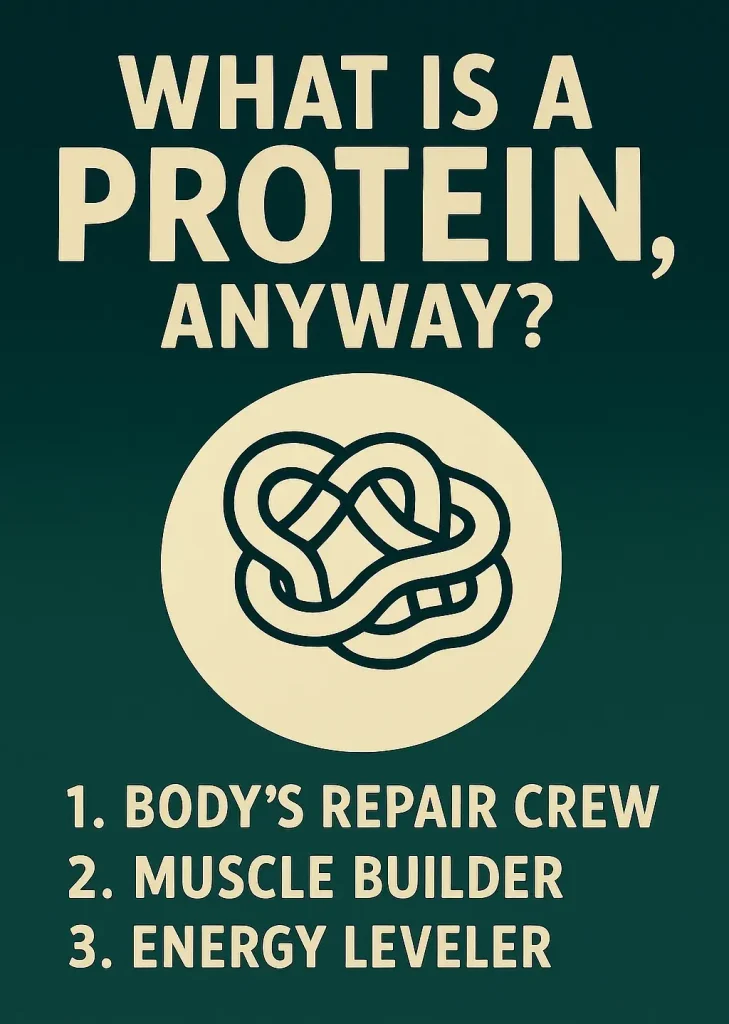
What are proteins, anyway?
- Body’s Repair Crew – Think of protein as a tiny repair crew that fixes everything in your body—from muscles to hair and nails!
- Muscle Builder – Protein helps build and repair muscles, especially after workouts.
- Energy Leveler – Protein gives you steady energy (without crashes like sugar) and helps your body burn calories better.
How does protein help my fitness (and weight)?
- Training creates tiny tears in your muscles—protein rebuilds them.
- For weight loss, your body can burn muscle along with fat—protein helps protect lean muscle. Combining protein with resistance training ensures your body sheds fat, not muscle.
- Protein provides the essential amino acid leucine, which triggers muscle protein synthesis—the process that builds new muscle.
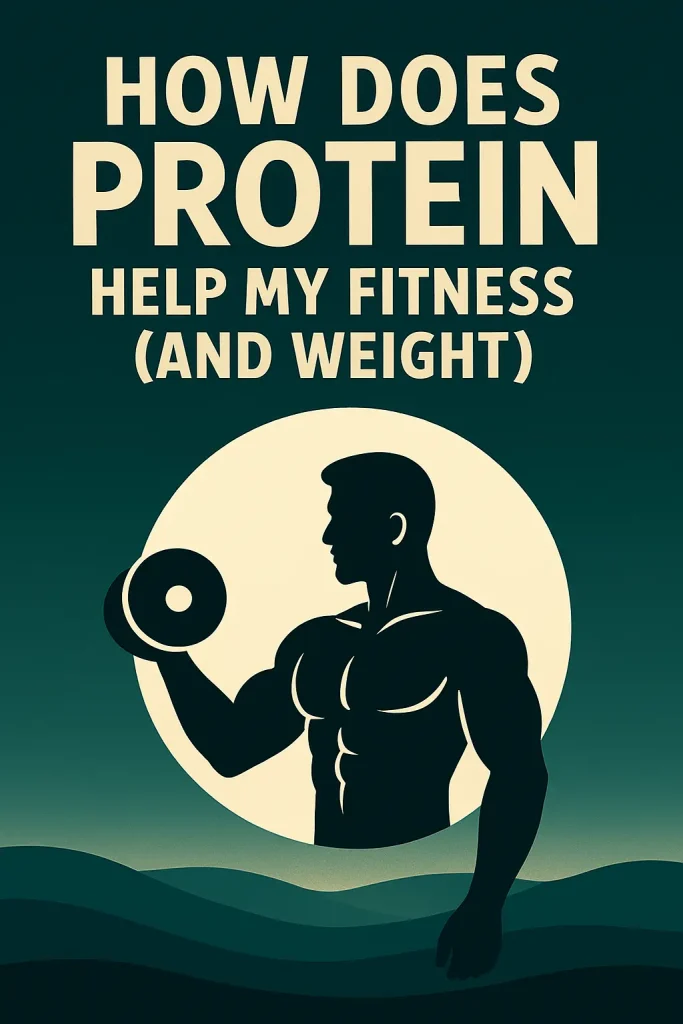
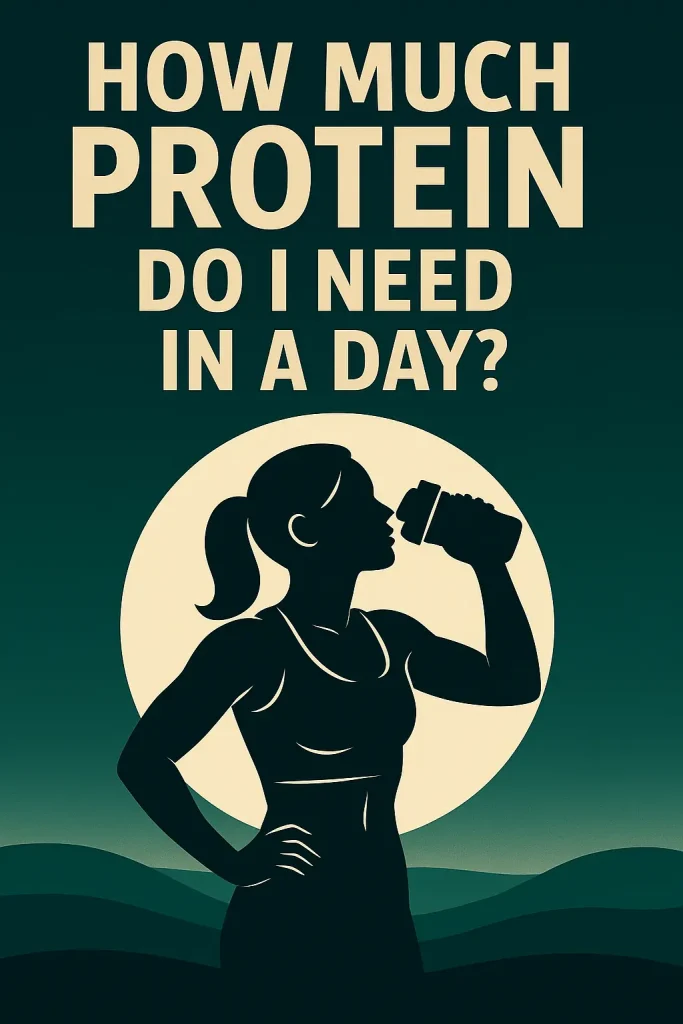
Protein Calculator: How Much Protein Do I Need in a Day?
The exact amount depends on your age, weight, and activity level:
We use an RDA formula that is targeted for general health and our expert formula is based on evidence-based calculations for optimal muscle growth, scroll below to see how our tool works.
What Are the Best High-Protein Foods?
Animal-based protein-rich foods
- Eggs
- Chicken breast
- Cottage cheese
- Greek yogurt
- Milk
- Lean beef
- Tuna
- Turkey breast
- Fish
- Shrimp
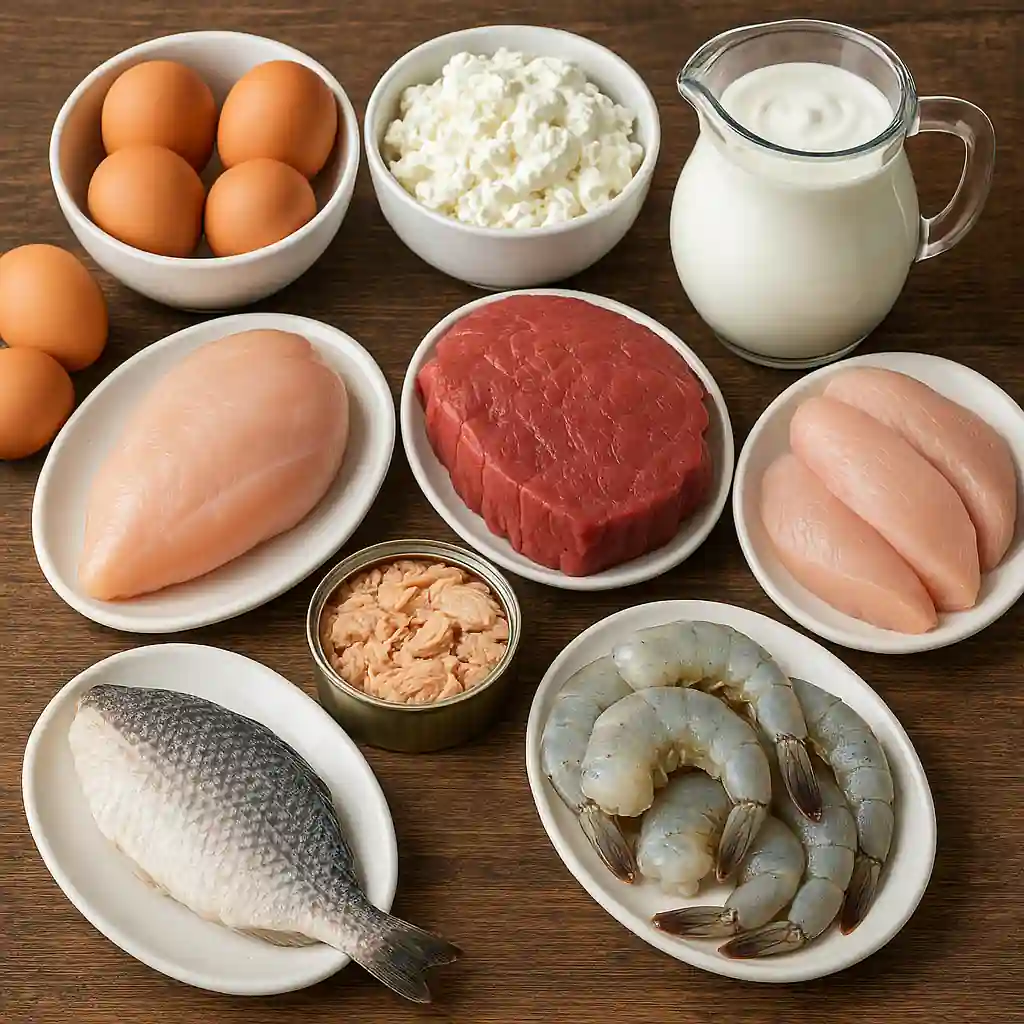
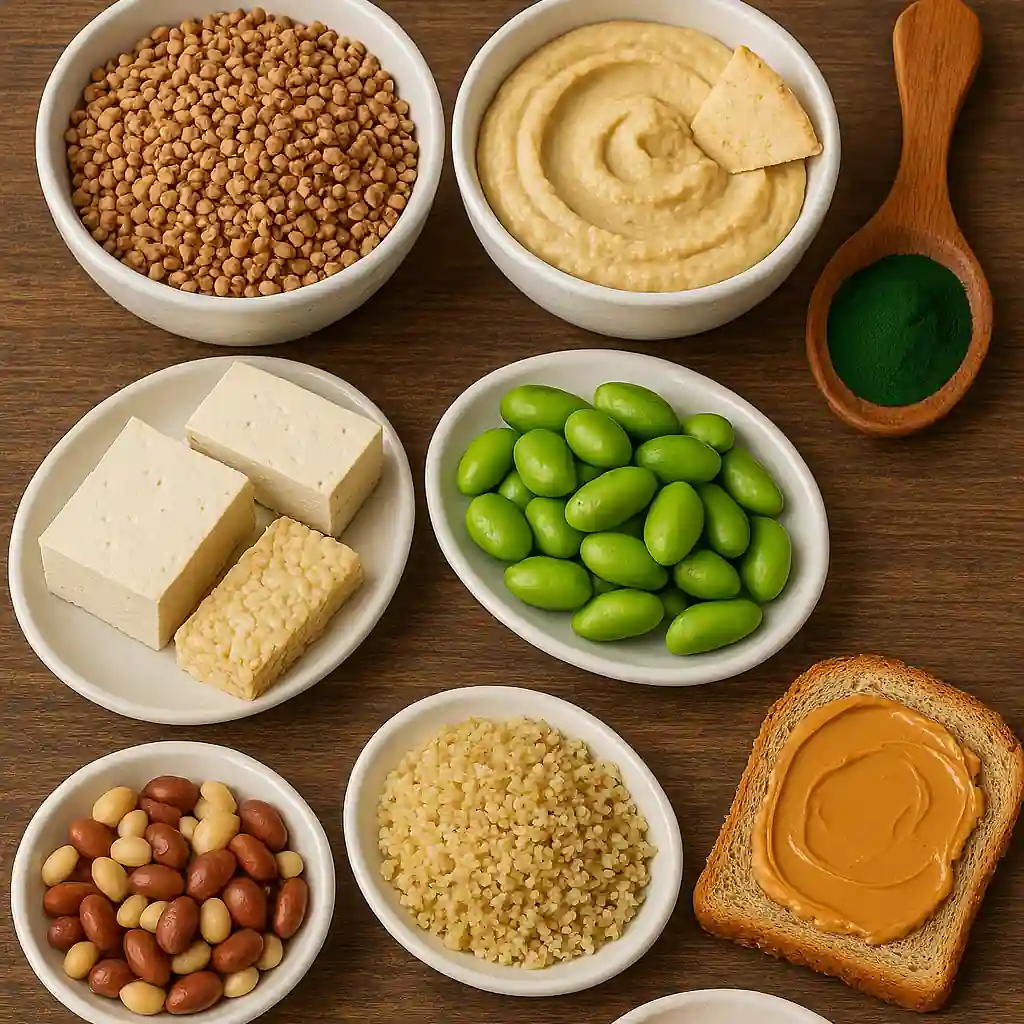
Plant Based protein-rich foods
- Buckwheat
- Hummus and pita
- Soy products (tofu, tempeh, edamame beans)
- Peanut butter on toast or some other bread
- Beans and rice
- Quinoa
- Hemp and chia seeds
- Spirulina
How Do I Calculate the Protein in My Food?
To calculate the protein in your food use the table below as a reference for how much protein is in 100g of food and multiply by there. For example, if you are eating 600 grams of chicken, and there are 31 grams of protein per 100g, you will be eating 31g times 6 = 186g of protein, more than enough for the day.
Some notes
- Animal-based proteins (meat, fish, dairy) are complete proteins (contain all essential amino acids).
- Plant-based proteins (beans, lentils, tofu) may need combining (e.g., rice + beans) for complete amino acids.
- Moreover, the absorption of plant-based proteins is not as high as meat-based protein, so eating 20g of protein from meat is not the same as eating 20g of nuts.
- Cooking methods (grilling vs. frying) can slightly alter protein content.
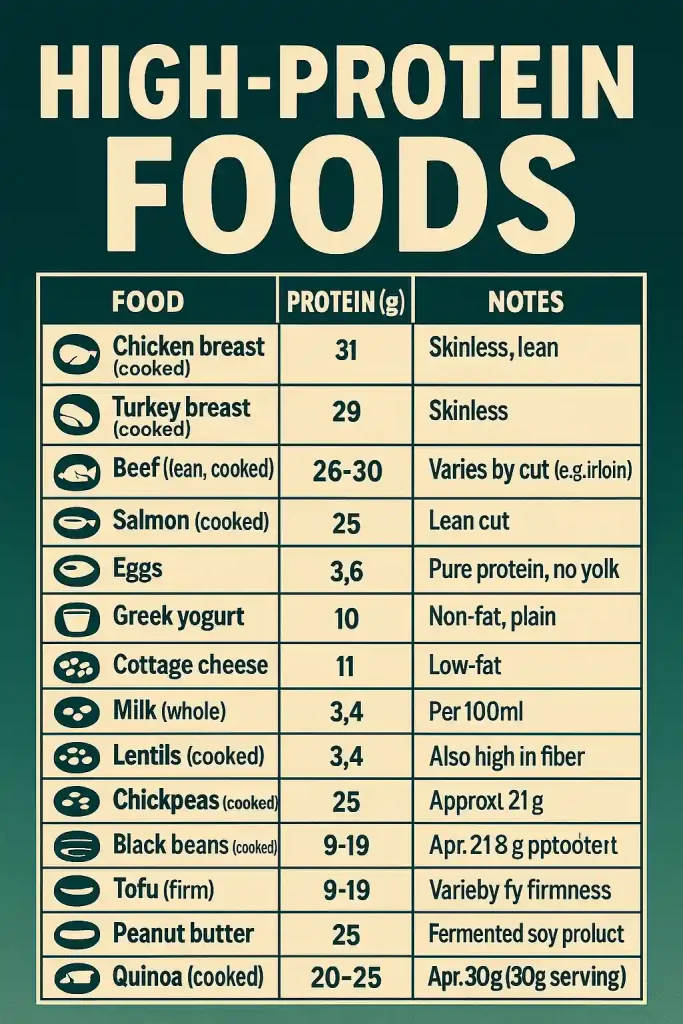
How Did We Calculate Your Protein Intake?
First, we give you a recommended RDA recommendation which is calculated by multiplying your weight in kg by 0.8, giving you a low estimate of how much protein you should eat per day. While RDA is focused on your general health, it doesn’t give good metrics for optimal muscle building.
We then formed our informed recommendation based on optimal muscle-building formulas (multiplying your weight in lbs by 0.75, then adjusting for gender and activity level).
Hope this gives you a good enough explanation of how we calculate protein
Proteins and weight loss
There is this big misconception that if you want to lose weight you should lower your protein as well, and lots of calculators on the internet will tell you to do the same. But that is false. Reducing your protein intake to lose fat will make you lose more muscle as a byproduct, something you don’t want.
Instead, you should aim to decrease your carb and fat intake. Fat keeps you satiated for longer but has a lot of calories, while carbs raise your insulin and don’t do as great a job of keeping you satiated. My personal preference is to drop carbs and have more fat, but it depends on you.
Protein deficiency
Protein deficiency can cause muscle loss, anemia, lowering your metabolism, and lots of other problems. Your muscles also store glucose and have a big correlation with mortality.
Of course, too much of it will do more harm than good, leading to heart problems. But if you prioritize health, muscle mass is not just a vanity metric, but an essential objective. After you get the daily protein needed, make sure to follow a structured calisthenics workout.
FAQs
This calculator caters exclusively to adults 18+. Our protein formula delivers educational insights, not medical advice. The calorie and macro recommendations? They’re scientific estimates designed to point you in the right direction. For personalized nutrition guidance that truly fits your unique profile, we recommend consulting a sports dietician or nutritionist who can craft a plan specifically for you. For more information, contact us.
